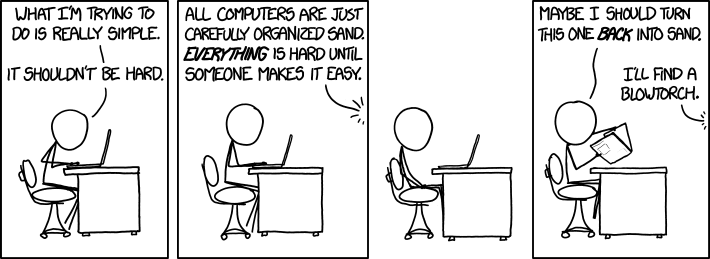I share the feeling of @Abab9579 – it feels to me that Haskell is somehow slipping down. But when I look for facts, I don’t see evidence to substantiate this feeling.
Just last night, I took a spin at all this. I found two independent rankings of programming language popularity: TIOBE and PYPL. Both of these suggest Haskell isn’t all that popular… but neither suggests (at all!) that Haskell is in decline. Here are the relevant graphs:
PYPL:
Both of these graphs suggest we are in some kind of steady state.
Other more fact-based metrics:
- GHC is having glory days right now. In the first time since I’ve been involved (mid-2012), we have a reliable, dedicated team of 5 people who offer GHC love and care – and this doesn’t include Simon or me. Because I can no longer keep up, just today I turned off “the firehose”: I no longer will be notified on every action on every GHC ticket. There are two (very positive) reasons I did this: 1) The activity has increased to a point that a part-time contributor like me cannot handle, and 2) the GHC team can now be relied on to send me the tickets I need to know about. Even two years ago, I would have worried that tickets would slip through the cracks or that I might miss something important. I don’t have that worry any more.
- HLS is a real success story, as @tomjaguarpaw points out. HLS started as two separate projects which decided it was better to work together than to compete, and it is a real joy being able to navigate source code without using grep. There is still more progress to be made here, but already I, for one, am reaping the benefits of this work.
- Six or seven years ago, I felt I basically knew all the companies using Haskell. I might not have contacts at each one, but seeing the company name associated with Haskell wouldn’t have surprised me. Now, on the other hand, reading the job ads in the Haskell Weekly News, it seems a new company posts there every few weeks – companies I had never heard of before. I don’t have a graph to share here, but the rate at which new companies are hiring Haskellers is higher than I’ve ever seen it.
- There are now a number of large companies with strong, vested interests in keeping Haskell going. By “vested interest”, I mean what I believe to be >1M lines of Haskell code. At multiple companies. These companies will protect the language as they protect their own investment.
- New books keep hitting the (virtual and physical) shelves. Publishers and authors would not make the monumental investment in a book if they felt the language were going away.
So, the real question for me is: why the feeling of negativity? I conjecture several reasons:
- When I joined Haskell 11 years ago, the locus of activity was around several mailing lists. As new technologies have come along, popularity of mailing lists has waned. But no one new venue for Haskell discourse has replaced the communities that we had. This has diluted the community, and it makes the community feel smaller, because we see less of it at any moment.
- The HCAR was published semi-annually for years. This stopped in 2018. It’s now hard to get a comprehensive handle on just what is going on in the Haskell universe, and this perhaps makes us feel that not much is going on.
- Being cynical about Haskell has somehow become the de-facto standard. We bemoan our lack of inclusiveness and approachability, we complain about our tooling, and we gripe about terrible error messages. There is opportunity to improve here, for sure. But other languages have similar problems, too: Rust’s moderation team resigned en masse; Scala is struggling with community moderation, too; and I don’t think we can argue that GHC’s error messages are worse than what we see when writing Standard Template Library code in C++. So it’s not clear to me that we’re really any worse than any other language or community in this regard. Collaboration and inclusiveness is hard! We need to keep trying our best here, but we can’t expect ourselves never to make mistakes.
- Haskell is maturing, and with that comes a change in expectations. When you see a five-year-old with pasta sauce all over their face and clothes, that’s cute and maybe you offer to help them clean up. When you see a similar 15-year-old, you wonder whether that person maybe has a problem they should work on. When Haskell was less mature, and our tooling didn’t quite work, we either dealt with it or rolled up our sleeves and tried to improve it. Yet with Haskell being more mature, we now have higher expectations of our tools and expect them to actually work. HLS is a great example here: when it works, it’s amazing. But it doesn’t quite work all the time, and that (for me) has been a source of frustration. That’s not really fair, though: I should just be thrilled with all the times it does work!
- When I came along, Haskell was the place to be for language innovation. Now, my sense is that Rust has taken that mantle from us. I would like to claim that back, but this is, again, a sign of maturity. You can’t, by definition, remain the new hotness for a long time!
My bottom line: though I feel sometimes that Haskell is in decline, I think it is doing just fine. And I also think that concentrating our community and promoting blog posts, etc., that glorify our language might even change the feeling.



